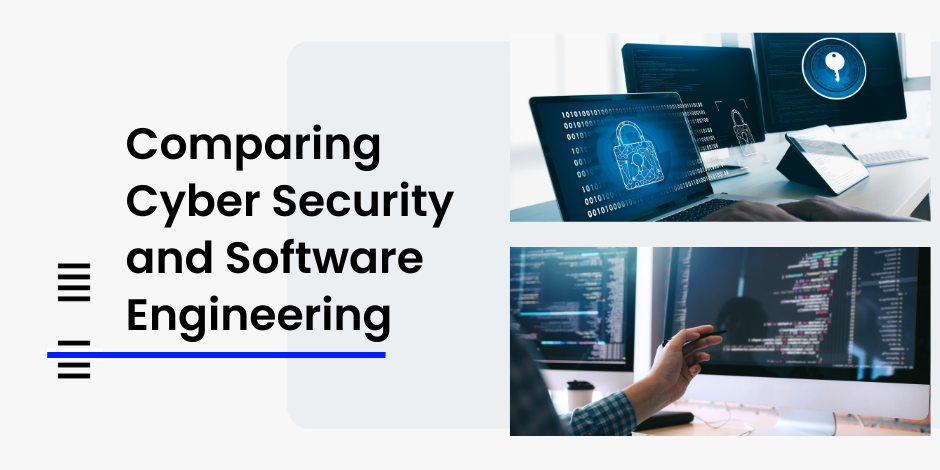Comparing Cybersecurity and Software Engineering

Stay Informed With Our Weekly Newsletter
Receive crucial updates on the ever-evolving landscape of technology and innovation.
In today’s digital age, where technology permeates every aspect of our lives, cybersecurity and software engineering have emerged as crucial fields.
Both disciplines are vital in securing our digital assets and protecting sensitive information from malicious attacks.
While cybersecurity focuses on safeguarding systems and data from unauthorized access, software engineering involves designing, developing, and maintaining software solutions.
Although their objectives may differ, cybersecurity and software engineering intersect in many ways, creating a symbiotic relationship in which each field relies on the other’s expertise.
Understanding the basics of cybersecurity and software engineering

Cybersecurity protects computer systems and networks from unauthorized access, data breaches, and other malicious activities.
It encompasses various processes, such as risk assessment, vulnerability management, incident response, and security audits.
A robust cybersecurity framework incorporates several layers of defense mechanisms, including firewalls, antivirus software, secure coding practices, and user awareness training.
On the other hand, software engineering involves systematically applying engineering principles, methods, and tools to develop high-quality software solutions.
Software engineers are responsible for the entire software development lifecycle, from requirements analysis and design to coding, testing, and maintenance.
They employ various software development methodologies and programming languages to create reliable, efficient, and secure applications.
Defining cybersecurity: A brief overview
Cybersecurity encompasses a wide range of practices to protect computer systems, networks, and data from data breaches, unauthorized access, and other cyber threats.
It involves implementing various security measures, such as firewalls, intrusion detection systems, encryption algorithms, and access controls, to ensure information confidentiality, integrity, and availability.
Software engineering: An introduction
Software engineering is a discipline that combines scientific principles, engineering techniques, and project management approaches to create and maintain software systems.
It involves a systematic and disciplined approach to software development, encompassing requirements analysis, design, coding, and testing.
Software engineers use various tools and methodologies to develop software that meets user needs, is reliable, and adheres to industry standards.
The intersection of cybersecurity and software engineering

While cybersecurity and software engineering may appear distinct, they share a symbiotic relationship.
Software engineering provides the foundation for secure software development, ensuring that applications are built with security.
Cybersecurity, in turn, enhances the security of software systems, protecting them from threats and vulnerabilities.
The role of software engineering in cybersecurity
Software engineering plays a crucial role in cybersecurity by incorporating security measures into the software development lifecycle.
Secure coding practices, such as input validation, output sanitization, and access control, help prevent common vulnerabilities like SQL injection and cross-site scripting.
By following secure coding guidelines, software engineers create robust, resilient software solutions less susceptible to cyber-attacks.
Additionally, advanced techniques, such as secure software design and threat modeling, enable software engineers to identify potential security risks early in development.
By considering security requirements from the outset, software engineers can design software architectures that are inherently secure and resistant to attacks.
How cybersecurity principles apply to software engineering
Cybersecurity principles like confidentiality, integrity, availability, and non-repudiation are fundamental to software engineering.
Software engineers must consider these principles during software development’s requirements analysis, design, and implementation phases.
Software engineers ensure that software systems meet the necessary security requirements by incorporating security controls and mechanisms, such as encryption, access controls, and auditing.
As part of the secure software development lifecycle, software engineers conduct thorough testing and code reviews to detect and fix vulnerabilities.
They also collaborate with cybersecurity professionals to perform penetration testing and vulnerability assessments, ensuring that software systems are resilient to attacks.
Key differences between cybersecurity and software engineering
While cybersecurity and software engineering share common goals, there are critical differences between the two disciplines.
These differences stem from their varied objectives, goals, skill sets, and knowledge requirements.
Differing objectives and goals
Cybersecurity protects computer systems and networks from unauthorized access and data breaches.
Its main goal is to ensure information confidentiality, integrity, and availability.
In contrast, software engineering aims to design, develop, and maintain software solutions that meet user needs and adhere to quality standards.
While both fields contribute to the security of software systems, their objectives differ significantly.
Varied skill sets and knowledge requirements
Cybersecurity professionals require a deep understanding of networking concepts, cryptography, security protocols, malware analysis, and incident response.
They must be proficient in threat intelligence gathering, security assessments, and risk management.
On the other hand, software engineers need knowledge of software development methodologies and frameworks, strong programming skills, and an understanding of algorithms and data structures.
While some overlap exists between the skill sets required for both fields, each discipline has specialized knowledge and expertise.
The importance of cybersecurity in software engineering
Cybersecurity is of paramount importance in software engineering.
The potential for cyber attacks and security breaches grows as software systems become increasingly interconnected and reliant on networks.
Software engineers must prioritize security during development, implementing robust security measures to safeguard software systems from unauthorized access and data breaches.
Protecting software integrity through cybersecurity
Cybersecurity measures, such as secure coding practices, vulnerability assessments, and penetration testing, help protect the integrity of software systems.
By identifying and fixing vulnerabilities before deployment, software engineers can mitigate the risk of exploitation and ensure that software functions as intended.
Additionally, encryption mechanisms, digital signatures, and secure protocols can prevent unauthorized tampering with software code and protect software integrity.
The impact of cybersecurity breaches on software systems
The consequences of cybersecurity breaches on software systems can be severe.
Breaches can compromise user data, expose sensitive information, and disrupt critical functions of software applications.
These breaches result in financial losses, damage an organization’s reputation, and erode customer trust.
By prioritizing cybersecurity in software engineering practices, software engineers can mitigate these risks, ensuring the resilience and reliability of software systems.
Future trends in cybersecurity and software engineering

Cybersecurity and software engineering face new challenges and opportunities as technology evolves.
Keeping pace with these changes is crucial to ensure the security of software systems and networks.
The rise of AI in cybersecurity and software engineering
Artificial intelligence (AI) is playing an increasingly important role in both cybersecurity and software engineering.
AI-powered tools and algorithms are being deployed to detect and respond to cyber threats in real time.
Machine learning models are used to analyze vast amounts of data and identify patterns indicating potential security breaches.
AI is being leveraged in software engineering to automate code generation, improve software testing, and enhance security analysis.
Integrating AI into cybersecurity and software engineering practices promises to revolutionize the field and strengthen the security of software systems.
The evolving landscape of cybersecurity threats and software solutions
Cybersecurity threats are constantly evolving, necessitating the development of new and advanced software solutions.
New vulnerabilities and attack vectors emerge as technologies such as the Internet of Things (IoT), cloud computing, and blockchain gain widespread adoption.
Software engineers must continuously adapt and adopt innovative security measures to counter these threats.
This includes developing secure IoT devices, implementing robust cloud security models, and exploring the potential of blockchain technology in enhancing cybersecurity.
Conclusion
In conclusion, cybersecurity and software engineering are critical disciplines that play complementary roles in securing our digital landscape.
While cybersecurity focuses on protecting computer systems, networks, and data, software engineering ensures the development of secure, reliable, and efficient software solutions.
The intersection of these fields is essential for creating a secure and resilient digital environment.
By understanding their differences, leveraging their synergies, and embracing emerging trends, we can safeguard our software systems and effectively mitigate cybersecurity risks.
Are you ready to launch your career?
Software engineering opens doors to diverse career opportunities in our ever-evolving digital world.
With a reputation for producing industry-ready professionals, the Institute of Data’s Software Engineering program will equip you with the expertise you’ll need to succeed.
Alternatively, you can learn more about the Institute of Data’s Cybersecurity program, which is designed and taught by industry experts.
We ensure students have a solid foundation to create impactful digital solutions, unlock innovation, and drive technological progress.
Ready to learn more about our programs? Contact our local team for a free career consultation today.




